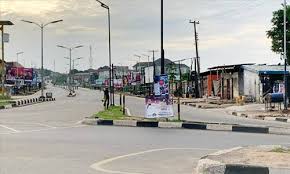Economic and social activities were completely grounded across Owerri and other parts of Imo State on Friday, as residents fully complied with the May 30 sit-at-home order, defying police assurances and the presence of heavily armed security personnel stationed across the state.
Despite repeated appeals from the Imo State Police Command urging residents to ignore the directive and go about their normal routines, the entire state capital remained eerily silent. Markets, schools, banks, government offices, and even major roads—such as the usually bustling Wetheral, Douglas, and Tetlow roads—were all deserted, leaving the city in a ghostly calm.
The sit-at-home directive, which is annually observed on May 30 to honour fallen Biafran heroes, was originally instituted by the now-proscribed Indigenous People of Biafra (IPOB). Though outlawed by the Nigerian government, IPOB’s influence continues to resonate across the southeast, with residents often complying out of fear of reprisal or in silent solidarity.
Even in the face of strong warnings and visible joint patrols, not a single commercial bus, private vehicle, or tricycle operator was seen plying the streets. Street traders, including those known for operating informally even during tense periods, were noticeably absent. Several business owners who spoke under condition of anonymity cited fear of attacks as their main reason for staying away, despite assurances from security forces.
A significant security presence was, however, observed across the state. Police, Army, Air Force, the Department of State Services (DSS), Nigeria Security and Civil Defence Corps (NSCDC), Federal Road Safety Corps (FRSC), Immigration Service, and Federal Fire Service operatives were all deployed in a coordinated show of force across the 27 local government areas of the state.
The Imo State Police Public Relations Officer, CSP Henry Okoye, confirmed the proactive security arrangement in a statement issued Friday morning. He disclosed that the Commissioner of Police, CP Aboki Danjuma, had activated robust inter-agency patrols to forestall any breakdown of law and order.
According to Okoye, “The Commissioner of Police has once again called on the good and law-abiding people of Imo State to disregard the disruptive sit-at-home threat issued by the proscribed Indigenous People of Biafra (IPOB) and its armed affiliate, the Eastern Security Network (ESN). He reassures all residents that the Command, in synergy with other security agencies, has activated robust security measures to forestall any form of threat or attack across the state.”
High-ranking security officers, including Brigadier General M.I. Abbas, Commander of the 34 Artillery Brigade in Obinze; DSS Director, DD Olushola Aguda; Air Commodore D.E. Bello, Commander of the Nigerian Air Force 211 Quick Response Group; and heads of the NSCDC, Immigration, FRSC, and Fire Service, have reportedly implemented joint strategies to ensure that no vacuum is created for criminal elements to operate.
“The joint operatives are currently undertaking intensive confidence-building patrols and show-of-force operations to deter criminal elements and reassure members of the public,” Okoye added.
The Police Command also issued a strong warning to any individual or group planning to enforce the sit-at-home through intimidation or violence, stating that such persons would be decisively dealt with according to the laws of the land.
CP Danjuma, through the command’s spokesperson, further urged residents to remain alert, security conscious, and report any suspicious activity to the nearest police formation or via the command’s emergency hotlines: 08034773600 and 08148024755.
While no incidents of violence were officially reported as of press time, Friday’s total compliance highlights the ongoing challenge faced by state authorities in restoring full civil order in a region still haunted by separatist sentiments and growing mistrust in government assurances.
